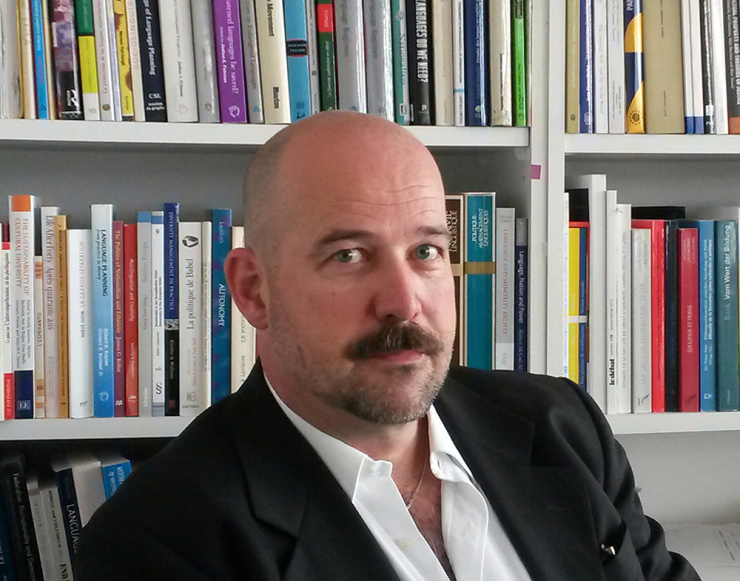Février 2020
Entretien
Spotlight on… François GRIN

See the original interview in French
François Grin is a professor of the Faculty of Translation and Interpreting (FTI), where he teaches Bachelor’s and Master’s level courses and heads the Economics, Languages and Education Research Group (Observatoire ÉLF). He specialises in language economics, education economics, and the evaluation of public policies in these fields. He is the author of numerous scientific publications and has directed many international-level projects. He is currently president of the Swiss delegation for the French language (Délégation suisse à la langue française). In this interview, he will be talking to us about the importance of mutilingualism, language policy and the activities of the Observatoire.
Why is multilingualism so important?
To begin with, it’s useful to situate translation and interpreting (T&I) in a larger social, political, economic and cultural context, and to understand how that context influences these two services. It is of particular importance when it comes to explaining the demand for T&I. This demand does not appear out of thin air, but is the result of factors that define this context. If the context were not multilingual, there would be no demand for these services or, by extension, the skills taught at the FTI. Research in language economics clearly demonstrates that multilingualism is preferable to uniformity in terms of efficiency and fairness. The Observatoire team has shown statistically that there is a significant, positive correlation between multilingualism and creativity. We have also provided estimations of unjustified transfers that result from linguistic uniformity, thereby demonstrating that diversity is more equitable.
How can we ensure that multilingualism doesn’t disappear?
Today’s world is multilingual, thanks to the existing diversity of languages. But multilingualism can erode, especially in an era of globalisation, and many people claim that it is a waste of time, or too costly or complicated. If we adopt such an attitude, we are accepting a linguistic hegemony, or at least the strong predominance of English in the academic, scientific, technological, commercial and diplomatic realms, to name just a few. It doesn’t matter whether it’s English or any other language. It’s uniformity that is the real danger. This is why we must support language diversity by implementing language policies that ensure multilingualism. Language policy is essential for T&I. This is the rationale for having a unit like the Observatoire ÉLF at the FTI.
Can you give as an example of language policy?
There are all kinds of language policies, which affect small minority languages and immigrant languages, as opposed to big national languages. When used wisely, these policies can protect and promote linguistic diversity. For example, when a country or international organisation decides that there will be several official languages, legal texts have to be translated, interpreters are required for parliamentary debates, and the safety requirements for a device or instructions for a medication have to be made available in several languages. Protecting minority languages also means supporting the media in those languages, which therefore requires T&I for radio, television and web content.
But how do we decide what language policy to adopt?
If public policy is brought in, it means that we expect it to deliver positive effects. After all, each intervention comes with costs. As with many other things, when it comes to language policy, we have to weigh the pros and the cons of each scenario. It’s not only about money. The symbolic costs and benefits can be just as important, and in some cases, even more so. In order to evaluate the advantages and drawbacks, we can turn to the economic and social sciences, and in particular, the interdisciplinary approach known as policy analysis. Its methods allow us to approach language policy in the same way that we would approach any other public policy, and to identify the policies that offer the best cost-benefit ratio (material and symbolic).
What does the Observatoire bring to the FTI in terms of its scientific and institutional environment?
The work of the Observatoire is extremely interdisciplinary and there are few research units of its kind. We can therefore help boost the FTI’s visibility and international profile. One way of doing so was through the Mobility and Inclusion in Multilingual Europe (MIME) project (2014-2018), which looked at “the challenge of multilingualism for the European citizen” and was coordinated by the Observatoire, bringing together researchers from eleven different disciplines. There was also the CreaQuest project (2015-2016), which examined the ties between multilingualism and creativity, combining sociolinguistics and psychometrics. Furthermore, the Observatoire handles the editorship of Language Problems and Language Planning, the oldest international academic journal in language policy. Other projects include putting together the Routledge Handbook of Language Policy and Planning in collaboration with colleagues from the UK, Canada and Australia. The Handbook, which contains around forty chapters, will be the first reference work to truly approach language policy as public policy.
Thank you, Professor Grin. Any concluding thoughts?
Just a word on where T&I stands with regard to the modern-day evolution of multilingualism. With the development of machine translation and the growth of foreign language skills in some socio-professional fields, particularly with English as a second language, translators no longer enjoy a monopoly when it comes to mastering the source and target languages. As a result, the demand for traditional translation and revision services is transforming and in some cases contracting, albeit without becoming obsolete. These developments are giving rise to new needs. Some require providing direct support to users in multilingual institutions. Others are related to traditional revision services, but differentiate themselves in the manner in which the text is processed beforehand. This may mean post-editing, but can also apply to a text that has been written in language X by a native speaker of Y who may overestimate their command of X. What then takes place lies somewhere between copy-editing and retranslation, requiring an excellent knowledge of the language that influenced the text when it was first drafted. Trained translators are primed to do such work, which leads us to other matters – but these questions would be the topic of another interview!
